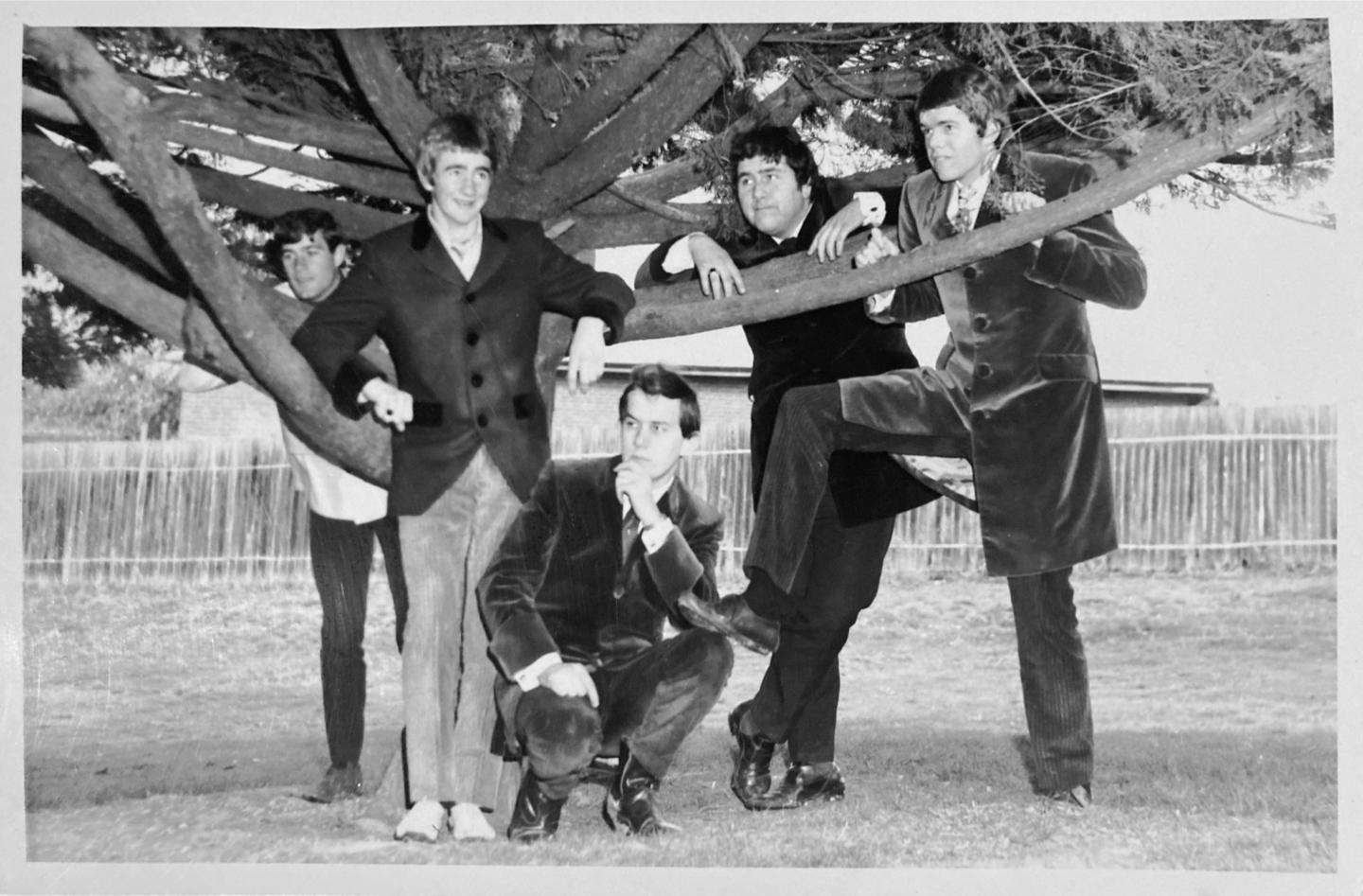
Tol-Puddle Martyrs promo shot 1967
By Jason Barnard
Peter Rechter takes us back to the garage rock scene of 1960s Australia from his early days with Peter & the Silhouettes to their evolution into the Tol-Puddle Martyrs. Peter shares insights into the creation of “Claudette Jones” and “Time Will Come” and his growing musical legacy.
How did your upbringing and the musical landscape as a teenager contribute to your development as a musician and songwriter?
At the age of eight, I started piano and music theory lessons. My mother was always singing around the house and my father played violin. My grandmother played the piano and my grandfather played the harmonica and there was often music in the household.
We always tuned into the top 10 on the radio, which came on once a week. I had an older brother who, when rock and roll hit, was right into it. And I can remember him taking me to the cinema to see Rock Around The Clock and Blackboard Jungle and going around to his friend’s place and listening to Buddy Holly as a youngster.
I can recall tuning into as many radio and TV shows as possible. In Australia, there was the Go Show and we also had from America, Shindig! and Hullabaloo. I loved those shows. I’d buy all the magazines, Fab Magazine and I even got magazines from England at the time. I would get the magazine and check out the charts, what was coming up the charts in England and then go to the record shops to see if they had it.
I bought as many 45s as I possibly could and early albums by The Rolling Stones and The Beatles. I just couldn’t get enough of it. I loved The Kinks, The Zombies, Dave Clark Five. All those bands had a huge influence on me and I thought, “Well, what could be better than this?” But something did happen and I was invited to try out for a new band by a friend of mine at school, Manuel Pappos. He was asked to play rhythm guitar in this band. So I went along to audition and I got the gig and that band became Peter & The Silhouettes.
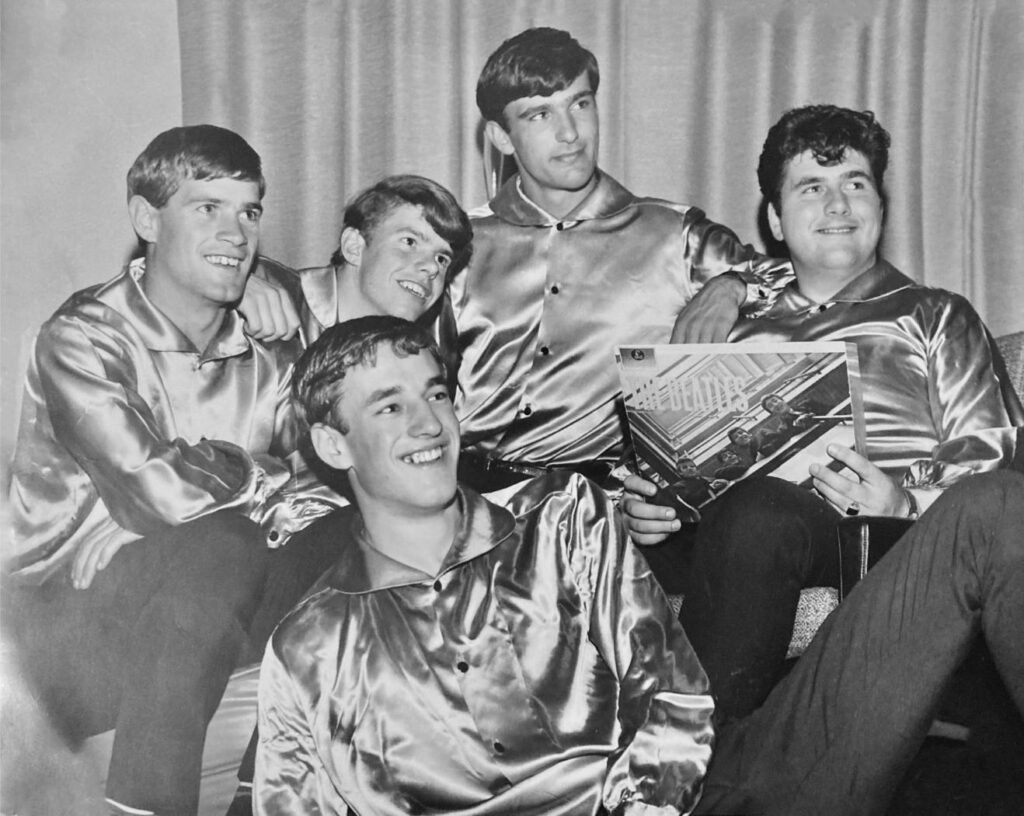
So what were you playing, Peter?
I was just singing at the time and playing maracas.
How come the band was called Peter & The Silhouettes?
At that time, we didn’t have a name. The bass player, Keiran Keogh, and the guitarist, Kevin Clancy, were about five or six years old older than myself and Manuel. The drummer at the time, Tony Truscott, was probably about three or four years older than us.
And they played a lot of instrumentals, a lot of Shadows music and so forth. And we got jobs here and there at RSL clubs. Kevin, he was a member of the pipe band in Golden Square, he played the bagpipes as well as guitar. He knew people at the Fire Brigade, and they were interested in starting a dance. So between the Fire Brigade and ourselves, we started this dance. The Fire Brigade people, they were at the door and did all the security work.
We played the music and it took a few months for it to hit off. But it really did get big. And the tram line from Bendigo to Golden Square, where the dance was, had to put on extra trams to bring the teenagers to the dance.
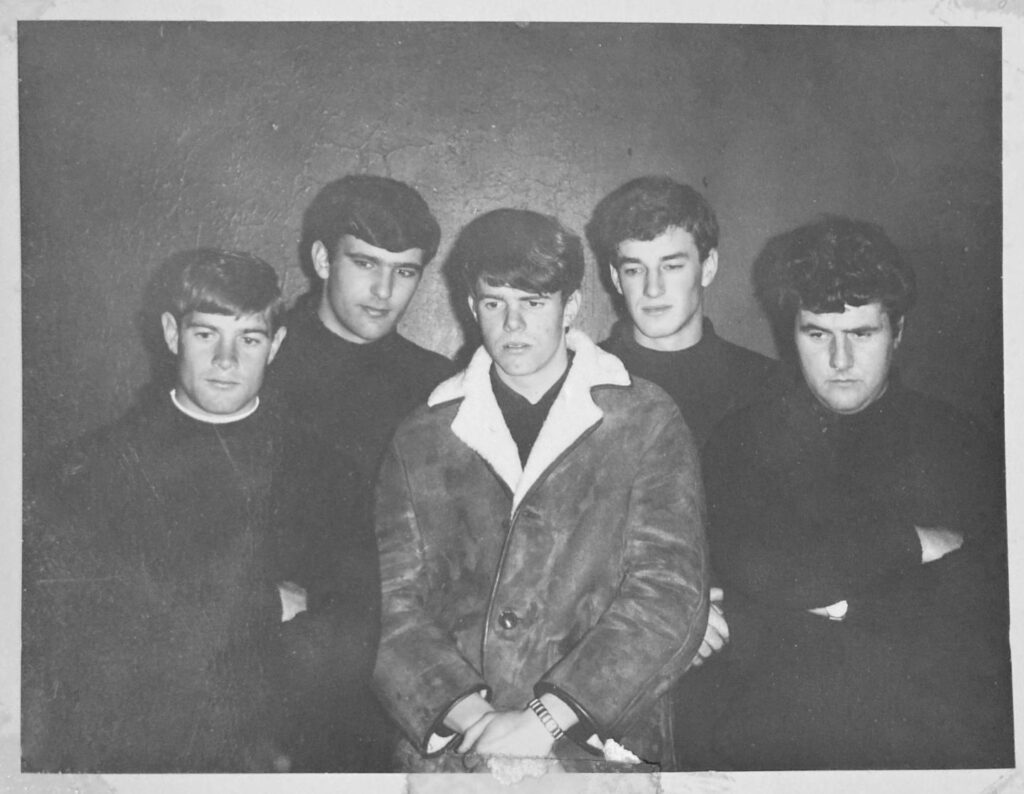
Now, what I noticed at the time was that when we played the songs that were coming out of England at the time, the kids loved it. But when Kevin decided to play instrumentals by The Shadows, there wasn’t all that much interest. So I pushed to get more modern songs in our repertoire. I decided then, because I learnt the piano and was making a few quid a week out of it, to buy myself a Farfisa organ, which cost me £400 at the time.
So the money that I earned from doing my paper round, and the band paid for that as well as a homemade amplifier that a chap in Bendigo called Alan Williams made. He was an electrician and had the local sound system for the Easter Fair and so forth. He made all our amplifiers. So we did become very, very popular.
The promoters in Bendigo, at the time, John Kiely, Colin James and Gavin Conroy, could see what was happening in Melbourne with all the bands and how big it was. They decided that they would promote the bands that were on their books. The way that they did it was that they decided that we should record an album of numerous bands. I forget how many bands there were. It might have been six or might have been eight, I don’t remember, from Bendigo and surrounding districts. Each group was given the opportunity to write and record two songs. I thought, well, this is my chance. I wanted it to sound now. I wanted it to sound like 1965, 1966.
I didn’t want it to sound like the 1950s. I wanted it to sound like The Kinks, The Easybeats, The Beatles. I wanted it to be like that. So at home, I sat down and I wrote the song, ‘Claudette Jones’. I came up with the lyrics and the melody and the chord progression and the riff. Kevin was the lead guitarist, he was a barber. I went down to his barber shop and we arranged it. He worked out his guitar solo. We were due to go and to record the song. It would have been in 1965 because it took quite a while for it to come out. Our drummer had a car accident in our Combi van, smashed our van and broke his leg. That was a week before we had to go into the studio to record. So we asked another drummer, a friend of ours called Len Gaskell, to come and fill in for Tony.
We had one rehearsal and you could feel the difference when Lenny got on the drums. It just lifted the songs. A week later, we went down to W&G recording studio in Melbourne. While we were waiting outside, the band before us had recorded their two songs.
While they were unpacking, we took our equipment in and set up and recorded the two songs, which were ‘Claudette Jones’ and ‘Natural Man’. The backing was just one off and live, no overdubs, nothing like that. I think it was recorded on two tracks. Then we put the vocals down and that was done, in a very, very short time. Then we packed up our stuff and the next band came in.
How far was Bendigo from Melbourne?
96 miles. I’d say we’re probably in there for maybe an hour at the most.
Peter & The Silhouettes became Tol-Puddle Martyrs. What was the instigation for that?
The drummer Tony, and the rhythm guitarist Manuel, left the band. We invited Lenny Gaskell who was in a band called the Playing Cards at the time to come in full time on drums, and Russell Hogan who was in a band called MI5 to play rhythm guitar.
Now people have often asked me how we got the name Tolpuddle Martyrs. With the change I wanted us to have a fresh start and I thought that the Silhouettes name was pretty old hat. I’d studied British history at school and I love the story of the Tolpuddle Martyrs and could see the Australian English connection to it. I liked the idea of them being the first trade unionists with me being a working class boy and that’s how we settled on the name. One of those promoters that I mentioned earlier on John Kiely, could see that there was something in the band and he became our manager and took us into the studio once again to record ‘Time Will Come’ and ‘Social Cell’.
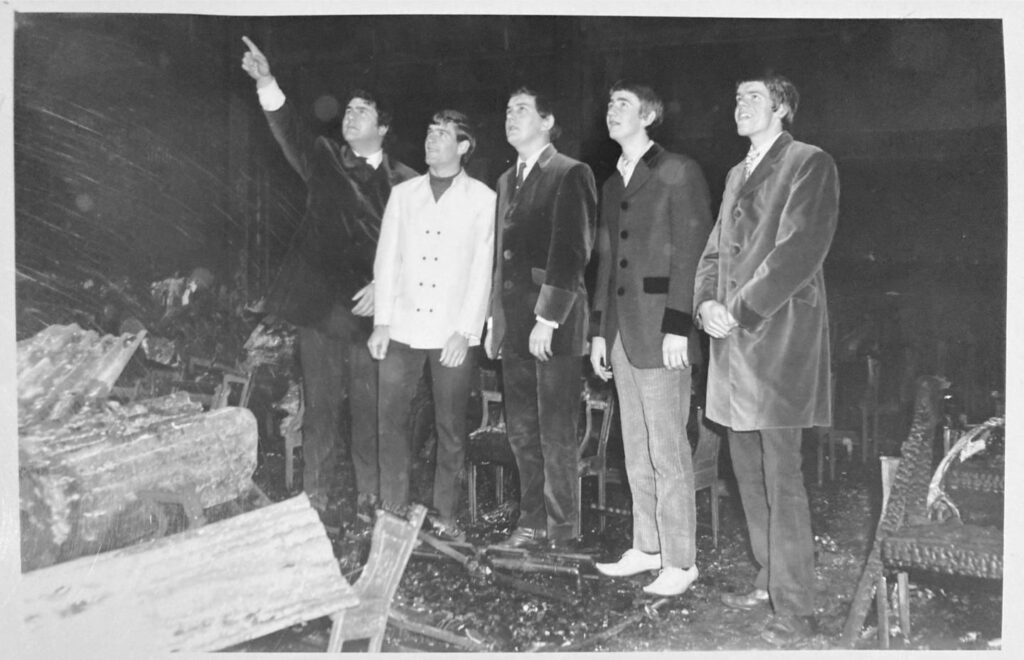
At that particular time the Vietnam War was well and truly on. Australia was involved and there was national service. The way it worked was, if my birth date was drawn out of the barrel, I would have to go to serve in Vietnam. I didn’t want to do that and my birthday didn’t come out thank goodness. But my way of saying I didn’t want to be involved was by writing the song ‘Time Will Come’. It was possibly my first protest song and I know that there was a huge change from Peter & The Silhouettes from girls and cars to death and destruction and wanting to get away from all of that. But that’s how I felt. I guess, yeah, I was frightened. I really didn’t want to be involved.
To write ‘Time Will Come’, I sat at home at the piano and wrote the song, the lyrics, melody and the riff. I wanted the riff to be dark and dissonant, which it was. When we went in to rehearse it Kevin said “Let me play the last four bars of the organ riff” so it starts with the Farfisa organ and then Kevin takes over with the guitar. The arrangement, we all sat down and we arranged that. The drums were Lenny’s idea and that rumbling bass was Keiran’s idea and Russell’s rhythm guitar which drives the song. Kevin’s feedback-laden solo was a real feature. Then we went into W&G studios in Melbourne once again and released ‘Time Will Come’ and ‘Social Cell’. ‘Social Cell’ was also a song that was how I thought about society where people were placed in their classes and I didn’t like that.
Now, you had quite a bit of success in Bendigo and entered a competition that was regional and then nationwide called the Hoadley’s Battle of the Bands. How did you go with that?
Well, with the Tol-Puddle Martyrs, I forget what year it was, it might have been 1967 or 68. We won the Central Victoria competition and then participated in the national regional final for all over Australia. And we won. The prize was a recording contract deal, however the label didn’t do very much for us
But yeah, it was pretty exciting. We played in front of a full house. I don’t know how many people the Festival Hall would hold? Maybe six, eight, ten thousand. But that was the biggest crowd that we’d played in front of at that particular time.
So yeah, it was great. We got so much work out of that, so much work. I forgot to mention too, even back with Peter & The Silhouettes with that album, which was called The Scene, there was a TV show and all the bands played their two songs on the TV show. We got a tremendous amount of work from that. So we were a very hardworking band, not just our Friday night job, but Friday, Saturday, Sunday, midweek as well.
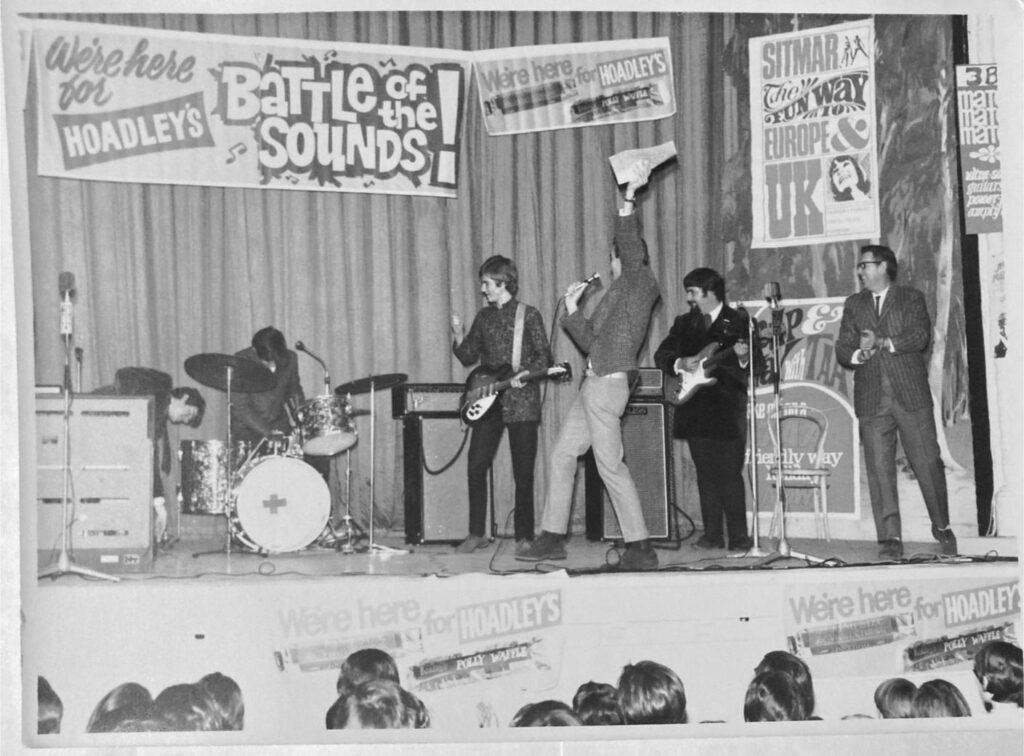
Playing all over, all around.
We were playing all over Central Victoria, Northern Victoria, and we even got onto the scene in Melbourne. But in Melbourne, I guess we were just another band, but in Bendigo we were huge, and Northern Victoria we were huge, and ‘Time Will Come’ charted, and it did get up to number six on the charts in Regional Victoria.
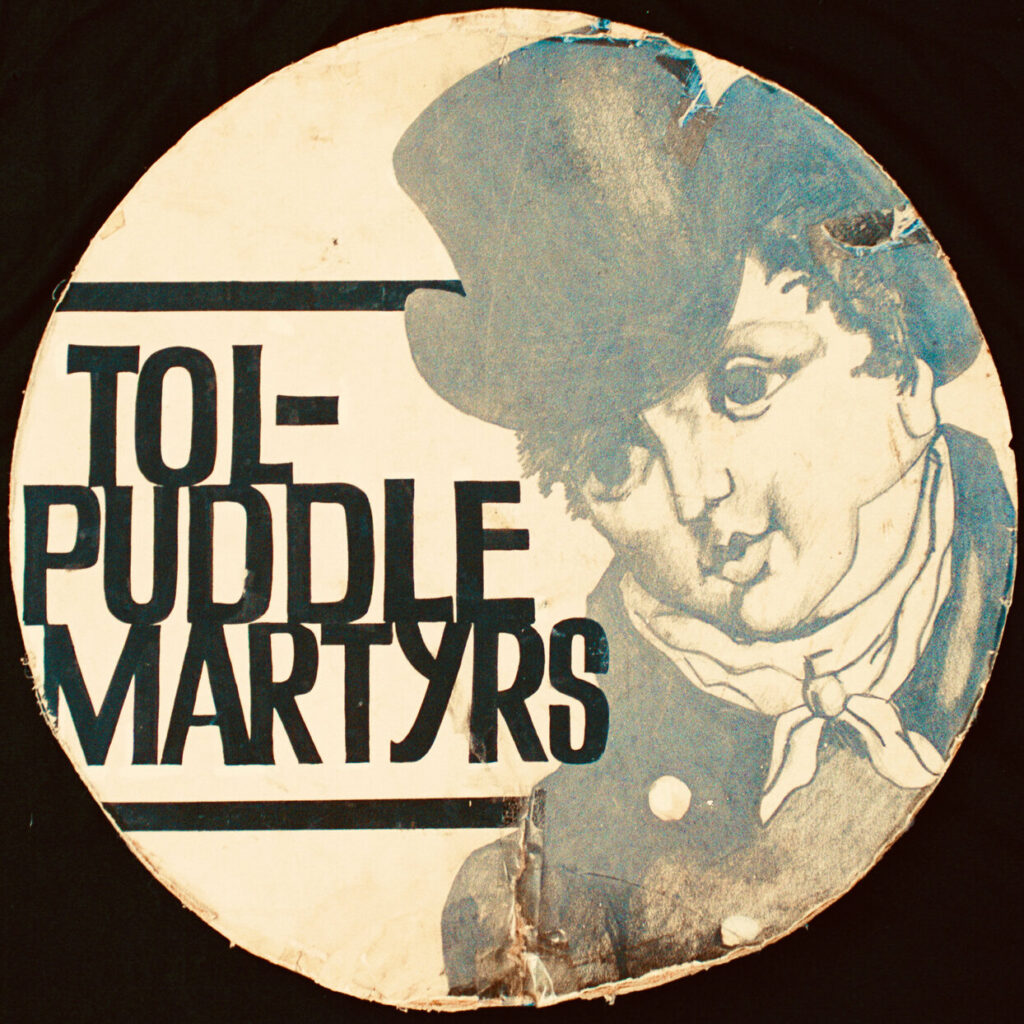
‘Claudette Jones’ was selected for the Australian Nuggets Collection Box Set released in 2013 by Warner Records. How did it feel to have your song included in such a prestigious collection?
It was really fantastic. Look, I’m a born optimist and I always believed in the songs, always believed in them. ‘Claudette Jones’ was never released as a single, it was only on that compilation album.
I hoped that one day that they would be recognised and yeah, it did happen. It was a big thrill to be on the Australian Nuggets and a big thrill to be picked up by bands around the world. ‘Claudette Jones’ was recorded by about six or eight different bands. When I first learned to use the computer and get on the internet, I did a search and came across all these bands that had recorded ‘Claudette Jones’. It was amazing.
‘Claudette Jones’ and ‘Time Will Come’ were on the Wild About You compilation. ‘Time Will Come’ was a single and there was a review in the Australian pop magazine called Go Set. I think they might have given it two stars and said, “Time will tell”. [laughs] I’ve still got that cutting.
When you started to re-release music in the early 2000s, lots of the songs on the Secrets album ‘Time Will Come’ and the Tol-Puddle Martyrs album ‘Psych-out USA’ have a very 60s feel. So what was the creative process like for producing new material that captured the essence of the era?
Well really I never stop writing music like that. And when we released the Tol-Puddle Martyrs album with the 60s tracks on, and put it on CD Baby, it sold really well. I did send it to a number of DJs, especially in America.
There was one DJ in particular called Robbie Russell, who really played ‘Time Will Come’, ‘Claudette Jones’, and ‘Social Cell’ quite a lot. And he wrote to me and he said, “Look I’m starting a new show called Psych-out USA. Can you help me out by writing a theme for it?” So I asked my colleague at the time, Graham McCoy, who is still my colleague. We just set about writing this song to help promote Robbie Russell’s radio show, and that became ‘Psych-out USA’.
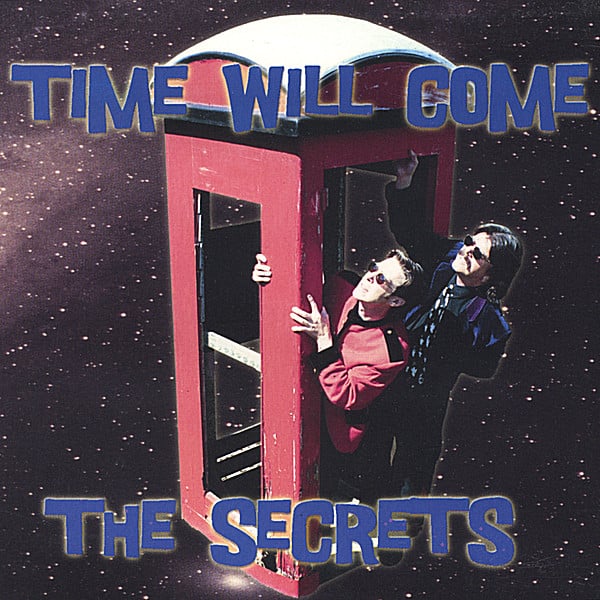
And we thought well, if we can do it with ‘Psych-out USA’, we can do it with other tracks, because we’re really both from that era. So we just sat down and we penned all these new songs. I actually listened to it today to prepare for this interview, Jason.
It includes songs like ‘Into My Life’, it’s a real love song about how I met my wife. ‘Chapel and Vine’, it’s a real Beatles type nostalgic song. I really love that one. Then there’s ‘Thinkin’ About You’, reflecting our love of the Kinks. I always wanted to write a Kinks, ‘You Really Got Me’ type song. ‘The Window’, I really like that song too. It wasn’t hard because we’d never stopped writing that style of song.
More recently you’ve released albums like ‘Polyphony’ in 2017 and ‘Another Earth’, 2018, ‘Brain Fade’ in 2019, ‘Under a Cloud’, 2021, and more recently ‘Houdini in Reverse’. So how has your musical style evolved over the years? What can listeners expect from your more recent work?
What can I say? I’ve still kept that 60s, 70s style of writing. Graham has been a huge influence on me with his love of certain bands he’s introduced me to, like Steely Dan.
Not that I hadn’t heard of them, but he really has shown me the way there. And I’ve just tried to make the songs as interesting as I possibly can with key changes and interesting chord progressions. And I say to people that I bake the cake, but Graham puts the icing on the top with the cherry and the cream in between. I think together we’ve done some pretty good things and the reaction of people has been truly fantastic. So it continually sells through CD Baby and all their outlets and we’re not complaining about that.
One of the songs on ‘Houdini in Reverse’ was written as a tribute to Queen Elizabeth, that’s right, called ‘Mrs. Windsor’, written when she was still alive for her 70th… Anniversary on the throne, yeah.
Tell us a little bit about that song.
Well, we’ve grown up with Queen Elizabeth in our lives. I really can’t remember a day without her until now. And to me, she’s an important person, or she was a very, very important person. I just wanted to pay tribute to her with all of the wonderful work that she’s done over all those years.
So we wanted to write it in a style that was of the time, the late 60s. We thought of, well, I said to Graham, “I think I’ve got this song that Paul McCartney and Ray Davies could have written together”. Graham had a listen to it and took it away and worked on it and said, “Yeah, I think we’ve got a song very similar to ‘Penny Lane’ with a tribute to Her Majesty.
It did get played in England on independent radio for a number of weeks. I don’t know how many people heard it. I don’t know if Her Majesty heard it or not. We did try to contact them, but they wouldn’t accept any gifts. So we couldn’t even send an MP3 so she could have a listen to it, which was disappointing because I think she would have loved it.
The YouTube clip of ‘Mrs Windsor’ was made by Steve Ludwig from Planet Ludwig. How did your association with him come about?
I was introduced to Steve by a friend, an ex-band member, Joe Mandica, and I started sending the CDs across to Steve. He showed a lot of interest in the songs and asked permission if he could make some film clips for the songs.
I said, “Sure, go ahead. That’d be fantastic”, which he did. He’s continued to do that, I think, from 2017 and he’s made so far almost 50 film clips. I have asked him if he would like to continue and he said, yes, he’d love to do that.
I said that he was an honorary member of the Tol-Puddle Martyrs. I thank Steve so much because of his work, I believe that the songs that Graham and myself have penned and recorded together have sold a lot more because of these film clips. So thank you, Steve.
Peter, your music has been featured in various films and series, such as Untogether and A Very English Scandal. How did the film and TV placements come about?
One morning in 2017, I received a linked in message through my emails from David Demarco in Los Angeles. It read “I’ve listened to your music on CD Baby. I feel that it’s ideal for film and television, flashbacks and period pieces. Are you interested? Please let me know.”
Of course I got in touch as soon as I possibly could. We sent the songs across to David, did all the legal business that was required. Since then, I’ve had almost 20 placements in film and TV, some pretty big shows, Pennyworth, Shameless, A Very English Scandal, plus a film with Billy Crystal and Ben Mendelsohn in called Untogether. It’s been pretty exciting. I’m very grateful to David and he’s a fantastic person to work with.
How does it feel to see your songs complementing visual storytelling and do you have a favourite placement?
Well, it’s probably been the most exciting part of my musical journey for that to happen. It’s like having a hit record. For A Very English Scandal, ‘Time Will Come’ went into the second official trailer. Just to hear it along with the dialogue with Hugh Grant, it was amazing. It blew me away. How fantastic is this? I knew how huge it was. I knew how huge A Very English Scandal was because it would have been played on the television in England for the week leading up to I think it was the second episode of A Very English Scandal.
Then when CD Baby wrote to me and said that they placed ‘Time Will Come’ in What We Do In The Shadows, I thought, oh, far out! I think it was in an episode called The Trial. It was over the credits at the end. It was just fantastic. So it’s very hard to express how I felt about that, but I can tell you I was floating.
Further information
Albums by Tol-Puddle Martyrs: Houdini in Reverse, Under A Cloud, Brain Fade, Another Earth, Polyphony
Acknowledgements: With thanks to Graham McCoy for his support with this interview.
